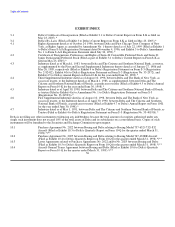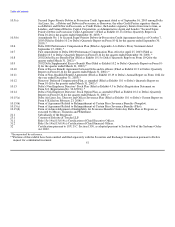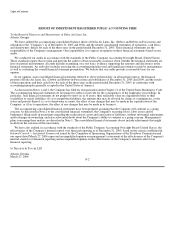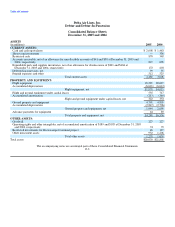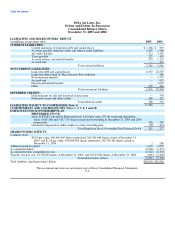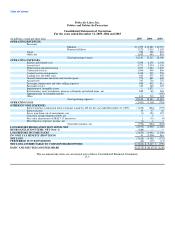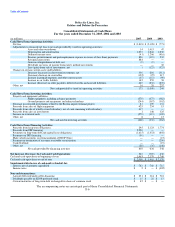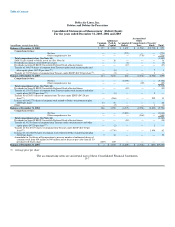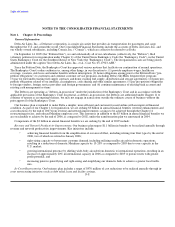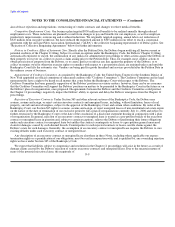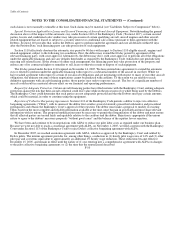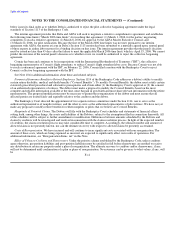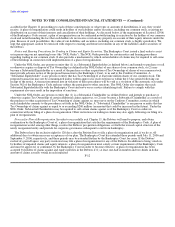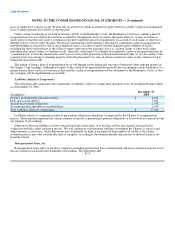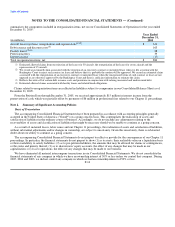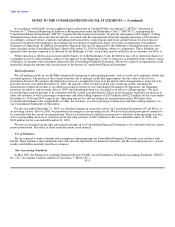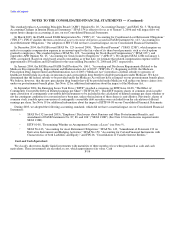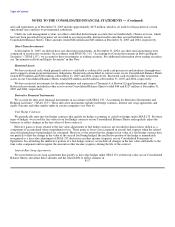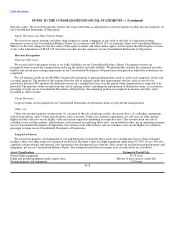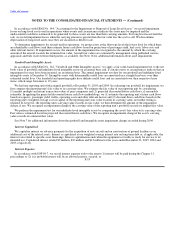Delta Airlines 2005 Annual Report Download - page 71
Download and view the complete annual report
Please find page 71 of the 2005 Delta Airlines annual report below. You can navigate through the pages in the report by either clicking on the pages listed below, or by using the keyword search tool below to find specific information within the annual report.
Table of Contents
NOTES TO THE CONSOLIDATED FINANCIAL STATEMENTS — (Continued)
aircraft lease rejections and negotiations, restructuring of vendor contracts and changes to retiree medical benefits.
Competitive Employment Costs. Our business plan targeted $930 million of benefits to be realized annually through reduced
employment costs. These reductions are planned to result from changes to pay and benefits for our employees, as well as employee
productivity improvements, outsourcing and overhead reductions. We originally targeted ongoing, annual labor cost reductions of
$325 million from our pilot workforce, but have reduced the requested amount to $305 million in our effort to reach a consensual
agreement with the Air Line Pilots Association, International ("ALPA"), the collective bargaining representative of Delta's pilots. See
"Rejection of Collective Bargaining Agreements" below for further information.
Notices to Creditors; Effect of Automatic Stay. Shortly after the Petition Date, the Debtors began notifying all known current or
potential creditors of the Chapter 11 filing. Subject to certain exceptions under the Bankruptcy Code, the Debtors' Chapter 11 filing
automatically enjoined, or stayed, the continuation of any judicial or administrative proceedings or other actions against the Debtors or
their property to recover on, collect or secure a claim arising prior to the Petition Date. Thus, for example, most creditor actions to
obtain possession of property from the Debtors, or to create, perfect or enforce any lien against the property of the Debtors, or to
collect on monies owed or otherwise exercise rights or remedies with respect to a pre-petition claim, are enjoined unless and until the
Bankruptcy Court lifts the automatic stay. Vendors are being paid for goods furnished and services provided after the Petition Date in
the ordinary course of business.
Appointment of Creditors Committee. As required by the Bankruptcy Code, the United States Trustee for the Southern District of
New York appointed an official committee of unsecured creditors (the "Creditors Committee"). The Creditors Committee and its legal
representatives have a right to be heard on all matters that come before the Bankruptcy Court with respect to the Debtors. The
Creditors Committee has been generally supportive of the Debtors' positions on various matters; however, there can be no assurance
that the Creditors Committee will support the Debtors' positions on matters to be presented to the Bankruptcy Court in the future or on
the Debtors' plan of reorganization, once proposed. Disagreements between the Debtors and the Creditors Committee could protract
the Chapter 11 proceedings, negatively impact the Debtors' ability to operate and delay the Debtors' emergence from the Chapter 11
proceedings.
Rejection of Executory Contracts. Under Section 365 and other relevant sections of the Bankruptcy Code, the Debtors may
assume, assume and assign, or reject certain executory contracts and unexpired leases, including, without limitation, leases of real
property, aircraft and aircraft engines, subject to the approval of the Bankruptcy Court and certain other conditions. By order of the
Bankruptcy Court, our Section 365 rights to assume, assume and assign, or reject unexpired leases of non-residential real estate expire
on the earlier of the date of termination of our exclusive period to file a plan of reorganization (currently July 11, 2006 and subject to
further extension by the Bankruptcy Court) or the date of the conclusion of a disclosure statement hearing in conjunction with a plan
of reorganization. In general, rejection of an executory contract or unexpired lease is treated as a pre-petition breach of the executory
contract or unexpired lease in question and, subject to certain exceptions, relieves the Debtors of performing their future obligations
under such executory contract or unexpired lease but entitles the contract counterparty or lessor to a pre-petition general unsecured
claim for damages caused by such deemed breach. Counterparties to such rejected contracts or leases can file claims against the
Debtors' estate for such damages. Generally, the assumption of an executory contract or unexpired lease requires the Debtors to cure
existing defaults under such executory contract or unexpired lease.
Any description of an executory contract or unexpired lease elsewhere in these Notes, including where applicable our express
termination rights or a quantification of our obligations, must be read in conjunction with, and is qualified by, any overriding rejection
rights we have under Section 365 of the Bankruptcy Code.
We expect that liabilities subject to compromise and resolution in the Chapter 11 proceedings will arise in the future as a result of
damage claims created by the Debtors' rejection of various executory contracts and unexpired leases. Due to the uncertain nature of
many of the potential rejection claims, the magnitude of F-9


